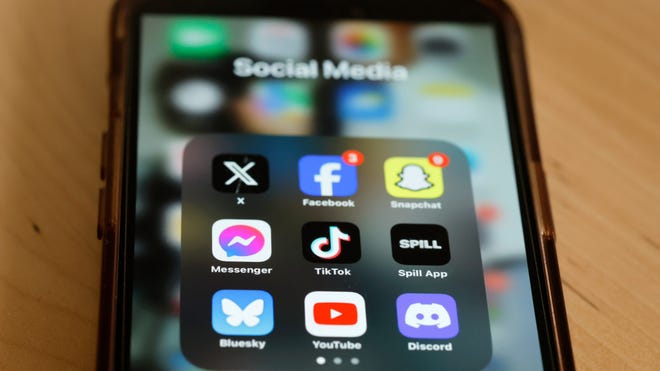TikTok’s new trend is alarming with threatening videos
Secret emails would arrive before bedtime: DO NOT DELETE THIS!!
If you don’t send this email to at least 6 people in the next 10 minutes, the ghost will haunt you too. Send this email to 3 friends before the Bloody Mary shows up at your door at 2:00 am
I thought my days of receiving haunted emails were long gone, lost somewhere between middle school and the death of email as a primary form of communication among friends. . Or maybe, it was their inevitable descent into the chains of the holiday text. But a new type of email has arrived – the impersonal, highly shared form of social media.
Lately, my TikTok For You page has been bombarded with “cursed” shows and videos. Some instructions are vague: “Return or accept the worst news of your life tomorrow.” Others play on the insecurities of relationships: “DON’T MOVE. He decides between you and another girl. Love and follow being in a relationship in December. Jump, it’s over.
But these videos are getting worse and worse, and they scare me sometimes. Another variation just visited my feed: “Talk 3 times and send this message or your mother will die tonight.”
And although my logical thought is that these were created by someone on his smartphone who wants to share, I can’t help myself for a split second: What if their predictions turn out to be true ?
While others can pass these videos easily, people with mental health conditions such as obsessive-compulsive disorder (OCD) are particularly vulnerable, according to OCD expert and clinical psychologist Brad Reimann. TikTok’s algorithms generate ads based on what users interact with; If someone continues to engage, these videos will appear more often (so I should have hit “not interested” the first time one of them appeared). This cyclic type can manifest itself as “digital OCD.”
“This is how a person with OCD is wired. They get these negative thoughts. They feel compelled to do something, which may happen over and over again, to try to prevent the bad event from happening. It’s happening,” Reimann says. “So to have this kind of stuff coming out on their social media is kind of their worst nightmare.”
What is OCD, and how does it relate to the process?
Obsessive-compulsive disorder (OCD) is a mental health condition in which a person experiences uncontrollable and repetitive thoughts (obsessions), engages in repetitive behaviors (compulsions ), or both, according to the National Institute of Mental Health.
These ideas and recommendations can vary from person to person, says Reinmann. Some people couldn’t care less about dirt and germs, but are focused on the “bad things” that happen to people they love and care about.
Those people may not be aware that the threats in these videos are unfounded, according to Elliot Kaminetzky, a clinical psychologist and OCD expert. Interacting with these videos can “reflect the OCD experience,” as reposting or interacting with them leads to temporary relief.
Kaminetzky says: “A person affected by the video may recognize that it is a useless agricultural practice, but still make a ‘just in case’ order or minimize the inconvenience.
Also, some videos will tell users that they have to retype after a certain number of seconds to “trigger” the luck.
Kaminetzky says: “Even after the return, (my people) are always afraid that it was not sent fast enough, which leads to forced implementation.
What is OCD?Know the symptoms of obsessive compulsive disorder, why it is so misunderstood
Who are these videos aimed at?
Perhaps, the creators of these videos do not intend to single out people with mental health conditions in particular. But, they are definitely looking for people who will be moved enough to participate.
Even for the general public, wishing harm on a loved one can cause distress and capture the attention of users, Kaminetzky says.
“TikTok is a business that creates an algorithm that tries to control your attention as much as possible,” Kaminetzky adds. “Based on people’s perception of the threat, these videos are likely to be used and therefore prioritized.”
Also:Are ‘gym bros’ cultivating a culture of orthorexia on TikTok?
How to stop participating in these videos, and what to do if you can’t
Kaminetzky and Reinmann both emphasize that it is important to resist the temptation to interact with these videos, but note that it is not always easy to overcome those urges. It’s okay to feel anxious or need help, but help is available.
“If someone has strong emotions and feels out of control, talking to an OCD specialist about it can help because it’s probably not the only source of anxiety,” says Kaminetzky.
According to Reinmann, the treatment of choice for OCD is “exposure and response prevention,” which gradually exposes people to situations that trigger their emotions in a safe environment, and helps them fight the urge to do so. their usual answers.
But if someone can’t ignore the videos or find a trainer who can help them, Reinmann has one last piece of advice: Delete the app, for your health and well-being.
#TikToks #trend #alarming #threatening #videos
